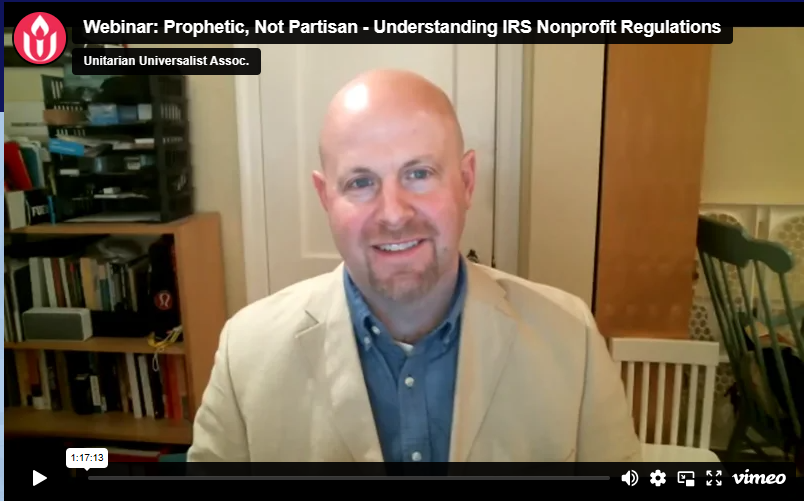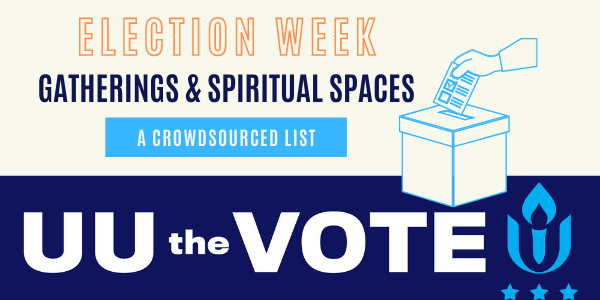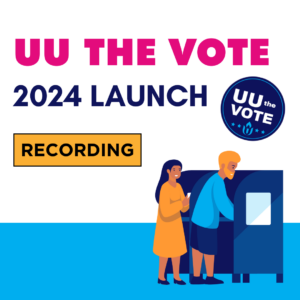As we dive into the work of UU the Vote in this election year, many congregations have questions about how to act boldly on behalf of our values while also remaining compliant with IRS non-profit/501(c)3 regulations. This interactive session was led by Attorney Davis Senseman, Esq. (Davis Law Office) and Rev. Rob Keithan (All Souls Church – DC, author of “The Real Rules“) and focused on some of the most commonly asked questions about congregational civic engagement and electoral work, interesting real-life case studies, and wonderings from our congregations as we head into UU the Vote 2020. This webinar was offered Feb 6, 2020.
- View the webinar video (note: webinar begins at 1:10)
- Download the webinar transcript (PDF)
- Download the chat from the webinar (PDF)
WHAT’S ALLOWED FOR 501(C)3 ORGANIZATIONS
The UUA, UU congregations and organizations can:
- Engage in issue advocacy and organizing for justice
- Conduct voter education
- Voter access through voter registration
- Get Out the Vote drives
- Combat voter suppression
- Support or oppose ballot initiatives
- Educate candidates on issues
- Sponsor candidate forums
- Prepare and distribute non-partisan voter guides
- Lobby elected officials
- Host a variety of activities at our congregations
The UUA, UU congregations and organizations cannot:
- Have advocacy as their only activity
- Endorse or oppose candidates running for elected office
- Intervene in campaigns to influence the outcome of an election
Progressive people of faith can be powerful and prophetic without being partisan. We can engage our neighbors, educate our communities, mobilize voters, rally around ballot initiatives, and shape the public discourse with values-based framing, rooted in our theology and principles. Electoral cycles offer heightened opportunities to engage and inspire people, mobilize around key issues, and to strengthen democracy, and win real advances on key issues on the ballot.
What tax-exempt status means for nonprofits
Religious individuals and groups have played a prophetic role in public life throughout history by calling attention to oppression, demanding change, organizing for justice, and holding leaders and institutions accountable for their actions and policies. We have a moral responsibility and are fully within our legal bounds to be a voice in the public policy arena and a force in mobilizing communities to advance our values 365 days a year. When it comes to electoral engagement, we know there are common concerns and at times misunderstanding that require simple guidelines to help us move forward.
The UUA, UU congregations, and many UU organizations have tax exempt designation with the Internal Revenue Service known as 501(c)3 status. Being a 501(c)3 means that a nonprofit organization has been approved by the IRS as a tax-exempt, charitable organization. Charitable is broadly defined as being established for purposes that are religious, educational, charitable, scientific, literary and more.
Collaboration and partnerships with 501(c)4 organizations
Many of the nonprofit justice issue-based and community organizing groups and democracy partners that UUs work with are 501(c)3 organizations that also have 501(c)4 arms, including some of our UU State Action Networks. These 501(c)4 organizations can do everything that 501(c)3 organizations can do; additionally they can engage in unlimited amounts of lobbying, endorse and oppose candidates, and engage in political campaigns (provided that such activities are not the organization’s primary activity). Coalitions and partnerships between 501(c)3 and 501(c)4 organizations and broad justice campaigns whose missions align are allowed and are a powerful way to work for justice.






